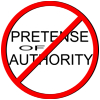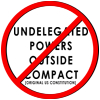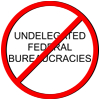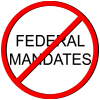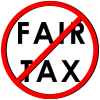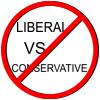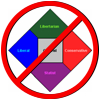|
The American Patriot Party
in regard to
The Foundations of Inalienable Rights.

This segment is to educate readers to:
1.) What freedom is, and what reserved rights are that a free people, each of us, possess;
2.) What rights and powers are still possessed by the states and the people;
3.) To establish this Party's stand regarding powers and liberty in any truly free country, from definitions of freedom established through 800 years of history, the Magna Carta, Common and Natural Law, The Rights of the Colonists, the Constitutional Debates, The Declaration of Independence;
The Declaration of Independence
Rights and Liberties 1776 - present In 1776, following the Declaration of Independence, the Articles of Confederacy are what this country began on, as the states by way of the Declaration and their own State Constitutions, were free and independent, possessing rights defined and rights reserved; and held by any state that considered itself free;
These rights were derived from earlier rights of the Rights of the Colonists, Common law, and Magna Carta. The last two recognized by their previous British Constitution.
The rights of free and independent states were expressly presented in the 37th and 39th Grievances of the Declaration of Independence:
The Declaration of Independence:
37th Grievance: "We, therefore, the representatives of the United States of America, in general congress assembled, appealing to the Supreme Judge of the World for the rectitude of our "intentions", do, in the name and by the authority of the good people of these colonies, solemnly publish and declare that these united colonies are, and of "right" ought to be, free and independent states;"
39th Grievance: "and that as free and independent states" they have full power to levy war, conclude peace, contract alliances, establish commerce, and to do all other acts and things which independent states may of "right" do."
Under this ENGAGEMENT and these oaths and intents, liberty and freedom was and is defined. States and people retain every right not expressly delegated to the Federal Government.
Declaration of Independence: "And for the support of this Declaration, with a "firm" "reliance" on the protection of "divine" "Providence", we mutually pledge to each other our Lives, our Fortunes and our sacred Honor."
It was for this document alone, that those who fought and died to give you your freedoms, sacrificed themselves.
The 40 Grievances that define tyranny in government are established in this Document:
46+ inalienable rights are established; Including the "purpose" of the document, of the inalienable right of a person or people to secede from their "former system of government". No government, including our own, that forces people to remain under rule or subjugation, or by oration of pretended support of freedom in its iron hold upon them, can ever be considered a free government.
Declaration of Independence: When, in the course of human events, it becomes necessary for one people to dissolve the political bands which have connected them with another, and to assume among the powers of the earth the separate and equal station to which the laws of nature and of nature's God entitle them, a decent respect to the opinions of mankind requires that they should declare the causes which impel them to the separation.
This Right is actually derived from earlier rights established in the Rights of the Colonists:
All Men have a Right to remain in a State of Nature as long as they please: And in case of intolerable Oppression, Civil or Religious, to "leave" the Society they belong to, and "enter" into another.--
The intent is clearly defined by the Founders.
Virginia Ratifying Convention of the Constitution, MONDAY, June 16, 1788:
James Madison: "An observation fell from a gentleman, on the same side with myself, which deserves to be attended to.*** If we be dissatisfied with the national government, if we "should choose to renounce {415} it", "this is an additional safeguard to our defence".
Here it is clear that separation, when necessary, is an essential natural right that men are clearly entitled by Nature and Nature's God. The word necessary is "defined in the Grievances" of the Declaration of Independence that define the definition of a tyrannical government worthy of being separated from; or powers of such a government to be dissolved and its powers removed.
These rights we as a free people and as independent states still possess.
That the United States "Federal Government" cannot in its pretended capacity, continue to abuse or expand its powers by creating internal improvements they have no delegated powers to;
And that they cannot be delegated "ever" to have;
Such powers that both burden this country from the costs of supporting the bureaucracy of regulation and with subjugation through untethered taxation, bribery from withholding tax money until states and its counties comply, manipulation by allowing collectives and special interests to control by distant mandates through national agreements and international treaties which force local communities into compliance such as through taxes, environmental and zoning laws; and raising the conditions to the point of refusing new appropriations of lands by the federal government (7th grievance - Declaration of Independence)*.
George Nicholas: "...If I understand it right, no "new" power can be exercised." (see complete following)
The framers of the Constitution were clear as to where the powers seated, and it was not in the federal government but in the people.
In a response to Patrick Henry who drew out their intent, James Madison made this very clear so that people will understand that the Constitution and the federal government is not a unlimited power but a "very limited" and "delegated" power.
In fact, if the states or people wished, they could remove the federal government in an instant by simply renouncing it.
... No?
Lets again review the "intent" of the Framers of the Constitution:
Virginia Ratifying Convention of the Constitution, MONDAY, June 16, 1788:
James Madison (in response to Patrick Henry's statement of caution): "An observation fell from a gentleman, on the same side with myself, which deserves to be attended to.
>>> If we be "dissatisfied" with the national government,
if we >>>"should "choose" to renounce {415} it",
"this is an >>> "additional safeguard" to our "defence"."
------------------
George Nicholas: "... He then proceeded thus: But, says he, who is to determine the extent of such powers? I say, the same power which, in all well-regulated communities, determines the "extent" of "legislative" powers.
If they exceed these powers, the judiciary WILL declare it void, or else >>>"the people" WILL have a "RIGHT" to ">>>declare it VOID".
Is this depending on any man? But, says the gentleman, it may go to any thing. It may destroy the trial by jury; and they may say it is necessary for providing for the general defence. The power of providing for the general defence only extends to raise any "sum of money" they may think necessary, by taxes, imposts,
But, says he, our (speaking of the proposed Constitution) only defence against oppressive laws consists in the virtue of our representatives. This was misrepresented.
If I understand it right, no "new" power can be exercised. As to those which are actually granted, we trust to the fellow-feelings of our representatives; and "if we are deceived", we then "trust" to "altering" our {444} "government".
It appears to me, however, that we can confide in their discharging their powers rightly, from the peculiarity of their situation, and connection with us. If, sir, the powers of the former Congress were very inconsiderable, that body did not deserve to have great powers.
It was so constructed that it would be dangerous to invest it with such. But why were the articles of the bill of rights read? Let him show us that those rights are given up by the Constitution. Let him prove them to be violated. He tells us that the most worthy characters of the country differ as to the necessity of a bill of rights. It is a simple and plain proposition.
It is agreed upon by all that "the people" have >>> ALL power.
If they part with any of it, is it necessary to declare that they retain the rest?
Liken it to any "similar case".
If I have one thousand acres of land, and I grant five hundred acres of it,
must I declare that I retain the other five hundred?
Do I grant the whole thousand acres, when I grant five hundred,
unless I declare that the five hundred I do not give belong to me still?
It is so in >>> "this" case.
After granting some powers, the rest must "remain with the people"."
It was viewed to be that simple, that clear, and that easy, by the framers of the Constitution.
Renounce it, Judge declare it void, or people declare it void, if we are deceived "alter it", "if there evinces a design... alter it or throw it out".
The powers granted were limited and all those rights previously held remain with the people.
Further, the states retain the right if dissatisfied with the Constitution can renounce it.
The Founders and Framers did not worship the Constitution or the federal government and neither should we.
Our defense, as was the founders, is of certain essential natural rights of which nature and nature's God entitle us, "not" governments.
This, of course, should be balanced with the Declaration of Independence:
"Prudence, indeed, will dictate that governments long established should not be changed for light and transient causes; and accordingly all experience hath shown that mankind are "more disposed to suffer", while evils are sufferable, than to "right themselves" by abolishing the forms to which they are "accustomed".
But when a long train of abuses and usurpations, pursuing invariably the same object, "evinces" a "design" to reduce them under absolute despotism, it is their right, it is their duty, to throw off such government and to provide new guards for their future security. Such has been the patient suffering of these colonies, and such is now the necessity which constrains them to alter their former systems of government"
But in no way does it remove the "right" or the "duty".
Our governments, state and federal, presently are not broken; their powers are simply being misused.
Here is a warning from the Founders that the powers of Congress should be kept limited and in check:
Virginia Ratifying Convention of the Constitution, MONDAY, June 16, 1788:
Patrick Henry: ...To me this appears a very alarming power, when unlimited. They are not only to raise, but to support, armies; and this support is to go to the utmost abilities of the United States. If Congress shall say that the "general welfare" requires it, they may keep armies continually on foot. There is no control on Congress in raising or stationing them. They may billet them on the people at pleasure. This unlimited authority is a most dangerous power: its "principles" are "despotic". If it be "unbounded", it must lead to despotism; for the power of a people in a free government is supposed to be "paramount" to the existing power.
..."The officers of Congress may come upon you now (speaking of the proposed Constitution), "fortified with all the terrors of paramount federal authority. Excisemen may come in multitudes; for the limitation of their numbers no man knows. They may, unless the general government be restrained by a bill of rights, or some similar restriction, go into your cellars and rooms, and search, ransack, and {449} measure, every thing you eat, drink, and wear.
They ought to be restrained Within "proper bounds".
Rights of the Colonists
Rights and Liberties 1772-present
"The natural liberty of man is to be free from any superior power on earth, and not to be under the will or legislative authority of man; but only to have the law of nature for his rule."--
------------
The absolute Rights of Englishmen, and all freemen in or out of Civil society, are principally, personal security personal liberty and private property.
All Persons born in the British American Colonies are by the "laws of God" and "nature", and by the >>>>Common law of England, >>>exclusive of >>>all charters from the Crown, well Entitled, and by the Acts of the British Parliament are declared to be entitled to all the natural essential, inherent & inseparable Rights Liberties and Privileges of Subjects born in Great Britain, or within the Realm. Among those Rights are the following; which "no men or body of men", consistently with their own rights as men and citizens or members of society, can for themselves "give up", or take away from others
First, "The first fundamental positive law of all Commonwealths or States, is the establishing the legislative power; as the first fundamental natural law also, which is to govern even the legislative power itself, is the preservation of the Society."6
Secondly, The Legislative has "no right" to absolute arbitrary power over the lives and fortunes of the people: Nor can mortals assume a prerogative, not only too high for men, but for Angels; and therefore reserved for the exercise of the Deity alone.--
"The Legislative "cannot" "Justly" assume to itself a power to rule by extempore arbitrary decrees; but it is bound to see that Justice is dispensed, and that the rights of the subjects be decided, by promulgated, standing and known laws, and authorized independent Judges;" that is independent as far as possible of Prince or People. "There shall be one rule of Justice for rich and poor; for the favorite in Court, and the Countryman at the Plough."7
Thirdly, The supreme power "cannot" "Justly" take from any man, "any part of his property" without his "consent", in person or by his "Representative".--
These are some of the "first principles" of natural law & Justice, and the "great Barriers" of "all free states", ."
-------------
1st. Natural Rights of the Colonists as Men.--
Among the Natural Rights of the Colonists are these First.
a Right to Life;
Secondly to Liberty;
thirdly to Property;
(Fourth) together with the >>>"Right" to support and "defend them" in the "BEST MANNER" they "can"--
Those are "evident Branches OF", rather than deductions from the
Duty of Self Preservation, commonly called the >>> "first Law of Nature"--
All Men have a Right to remain in a State of Nature as long as they "please": And in case of intolerable Oppression, Civil or Religious, to "leave" the Society they belong to, and "enter" into another.--
When Men enter into Society, it is by voluntary consent; and they have a right to demand and insist upon the performance of "such conditions", "And" "previous limitations" as form an equitable "ORIGINAL" compact.--
Every natural Right not expressly given up or from the nature of a Social Compact "necessarily" ceded remains.--
All positive and civil laws, should conform as far as possible, to the Law of natural reason and equity.--
(see party platform for complete)
Note: The words "leave" and "enter" are not meant solely through physical movement, but to change.
When this was written in 1772, the "leaving" and "entering" was figurative to "changing";
Which occurred in 1776.
To "insist upon the upon the performance of such conditions, And previous limitations as form an equitable original compact.--" meant they were not going anywhere, they were simply establishing regardless of where they were located or which governments existed, they "possessed" rights of "an equitable original compact" in and of themselves.
Patrick Henry knew that there was deficiencies in the Constitution and federal government and knew there needed to be a Bill of Rights more in this government than any other:
Virginia Ratifying Convention of the Constitution, MONDAY, June 16, 1788:
Patrick Henry: Mr. Chairman, the "necessity of a bill of rights" appears to me to be "greater" in this government "than ever it was in "any government before". "I have observed already, that the sense of the European nations, and particularly Great Britain, is against the construction of rights being retained which are not expressly relinquished. I repeat, that all nations have adopted this construction that all rights not expressly and unequivocally reserved to the people are "impliedly and incidentally relinquished to rulers", as necessarily inseparable from the delegated powers. It is so in Great Britain; for every possible right, which is not reserved to the people by some express provision or compact, is within the king's prerogative. It is so in that country which is "said" to be in such full possession of freedom.
(APP: Important note, notice that even then Britain and other governments attempted to assert falsely that they were "free" countries. This is so today with even our own government attempting to associate socialist countries with freedom stating often "nations of a free world", completely ignoring the fact that no nation whose people do not possess these certain inalienable rights can ever be considered a free nation.)
It is so in Spain, Germany, and other parts of the world.
Let us consider the sentiments which have been entertained by the people of America on this subject.
At the revolution, it must be admitted that it was their sense to set down those great rights which ought, in all countries, to be held inviolable and sacred. Virginia did so, we all remember. She made a compact to reserve, expressly, certain rights."
..."How were the congressional rights defined when the people of America united by a "CONFEDERACY"to defend their "liberties and rights" against the "tyrannical attempts" of Great Britain? The states were "not" then contented with implied reservation. No, Mr. Chairman. It was expressly declared in our Confederation that "every right" was retained by the states, respectively, which was not given up to the government of the United States. But there is no such thing here. You, therefore, by a natural and unavoidable "implication", give up your rights to the general government.
Your own example furnishes an argument against it. If you give up these powers, without a bill of rights, you will exhibit the most absurd thing to mankind that ever the world saw government that has abandoned all its powers the powers of direct taxation, the sword, and the purse. You have disposed of them to Congress, without a bill of rights without check, limitation, or control. And still you have checks and guards; still you keep barriers pointed where? Pointed against your weakened, prostrated, enervated state government! You have a bill of rights to defend "you" against the state government, which is "bereaved of all power", and yet you have "none" against Congress, though in fill and exclusive possession of all power! You arm yourselves against the weak and defenceless, and expose yourselves naked to the armed and powerful. Is not this a conduct of unexampled absurdity? What barriers have you to oppose to this most strong, energetic government? To that government you have nothing to oppose. All your defence is given up. This is a real, actual defect. It must strike the mind of every gentleman.
When our government was first instituted in Virginia, we "declared" the "common law" of England to be
>>>>"in force".
That system of law which has been admired, and "has protected us and our >>>ancestors", is excluded by that system. Added to this, we adopted a bill of rights. By this Constitution, some of the best barriers of human rights are "thrown away". Is there not an additional reason to have a bill of rights?
By the ancient common law, the trial of all facts is decided by a jury of impartial men from the immediate vicinage. This paper speaks of different juries from the common law in criminal cases; and in civil controversies {447} excludes trial by jury altogether. There is, therefore, more occasion for the "supplementary check" of a "bill of rights" now than then. Congress, from their general, powers, may fully go into business of "human" legislation".
(APP: This is a very important note of caution, as complete human legislation omits the laws of God and Nature)
"They may legislate, in criminal cases, from treason to the lowest offence petty larceny. They may define crimes and prescribe punishments. In the definition of crimes, I trust they will be directed by what wise representatives ought to be governed by. But when we come to punishments, no latitude ought to be left, nor dependence put on the virtue of representatives. What says our bill of rights? "that excessive bail ought not to be required, nor excessive fines imposed, nor cruel and unusual punishments inflicted." Are you not, therefore, now calling on those gentlemen who are to compose Congress, to prescribe trials and define punishments without this control? Will they find sentiments there similar to this bill of rights?
You "let them loose"; you do more you "depart from the genius" of your country."
To say the least, Patrick Henry kept the federalists on their toes.
All of us can be thankful to these Anti Federalist, Patrick Henry, George Mason and others; These Founders fought for and gave us the Bill of Rights; And through these debates extracted the true intents of the Federalists and AntiFederalists alike;
A fact which is very important as it is the intent that defines the law.
The problems we are experiencing today, is that the federal government is ignoring these "definitions" and is doing exactly what Patrick Henry has warned us:
"Congress, from their general, powers, may fully go into "business" of "human legislation"
...And not from the rights and liberties derived from Nature or Natures God, Mentioned here of earlier established and declared essential natural rights that the common law was founded upon and respected. "That system of law", he has stated, "which has been admired", and "has protected us and our ancestors"
These rights, derived from the Magna Carta, English Bill of Rights, Rights of the Colonists, and Declaration of Independence and as presented by the framers of the Constitution to still be retained by the people and in force have not gone away, nor are they hampered by the Constitution, or state Constitutions when properly administered.
English Bill of Rights
Rights and Liberties 1869 - present
Below are just a few of the early English Bill of Rights and Grievances (see Bill of Rights 1869 for complete)
Many that were carried to our Bill of Rights and through our Grievances of the Declaration of Independence.
English Bill of Rights 1689:
..."That the pretended power of dispensing with laws or the execution of laws by regal authority, as it hath been assumed and exercised of late, is illegal;
That the commission for erecting the late Court of Commissioners for Ecclesiastical Causes, and all other commissions and courts of like nature, are illegal and pernicious;
That levying money for or to the use of the Crown by pretence of prerogative, without grant of Parliament, for longer time, or in other manner than the same is or shall be granted, is illegal;
That it is the right of the subjects to petition the king, and all commitments and prosecutions for such petitioning are illegal;
That the raising or keeping a standing army within the kingdom in time of peace, unless it be with consent of Parliament, is against law;
That the subjects which are Protestants may have arms for their defence suitable to their conditions and as allowed by law;
That election of members of Parliament ought to be free;
That the freedom of speech and debates or proceedings in Parliament ought not to be impeached or questioned in any court or place out of Parliament;
That excessive bail ought not to be required, nor excessive fines imposed, nor cruel and unusual punishments inflicted;
That jurors ought to be duly impanelled and returned, and jurors which pass upon men in trials for high treason ought to be freeholders;
That all grants and promises of fines and forfeitures of particular persons before conviction are illegal and void;
And that for redress of all grievances, and for the amending, strengthening and preserving of the laws, Parliaments ought to be held frequently.
And they do claim, demand and insist upon all and singular the premises as their undoubted rights and liberties, and that no declarations, judgments, doings or proceedings to the prejudice of the people in any of the said premises ought in any wise to be drawn hereafter into consequence or example; to which demand of their rights they are particularly encouraged by the declaration of his Highness the prince of Orange as being the only means for obtaining a full redress and remedy therein. Having therefore an entire confidence that his said Highness the prince of Orange will perfect the deliverance so far advanced by him, and will still preserve them from the violation of their rights which they have here asserted, and from all other attempts upon their religion, rights and liberties, the said Lords Spiritual and Temporal and Commons assembled at Westminster do resolve that William and Mary, prince and princess of Orange, be and be declared king and queen of England, France and Ireland and the dominions thereunto belonging, to hold the crown and royal dignity of the said kingdoms and dominions to them, the said prince and princess, during their lives and the life of the survivor to them, and that the sole and full exercise of the regal power be only in and executed by the said prince of Orange in the names of the said prince and princess during their joint lives, and after their deceases the said crown and royal dignity of the same kingdoms and dominions to be to the heirs of the body of the said princess, and for default of such issue to the Princess Anne of Denmark and the heirs of her body, and for default of such issue to the heirs of the body of the said prince of Orange. And the Lords Spiritual and Temporal and Commons do pray the said prince and princess to accept the same accordingly.
And that the oaths hereafter mentioned be taken by all persons of whom the oaths have allegiance and supremacy might be required by law, instead of them; and that the said oaths of allegiance and supremacy be abrogated.
Common Law
Rights and Liberties 1215-present
And what is the Common Law they speak of, few Americans actually know it because it is not even taught within our schools, our people are ignorant as we have allowed our schools to avoid teaching common law and we have become ignorant.
The common law spoke of is not simply case law, but just law based upon early foundations of just and true liberty as it was defined by early established "essential natural rights and liberties".
Our courts have all but shunned its use and have begun exactly what was warned by Patrick Henry;
...by fully engaging in "human legislation".
What has this to do with anything?
Lets see what the Founders said in the debates:
Virginia Ratifying Convention of the Constitution, MONDAY, June 16, 1788:
Patrick Henry: We are told, we are afraid to trust ourselves; that our own representatives Congress will not exercise their powers oppressively; that we shall not enslave ourselves; that the militia cannot enslave themselves,
Who has enslaved France, Spain, Germany, Turkey, and other countries which groan under tyranny? They have been enslaved by the hands of their >>>"own people".
If it will be so in America, it will be only "as it has" been "every where else".
Mr. Corbin: "......Animadverting on Mr. Henry's observations, that the French had been the instruments of their own slavery, that the Germans had enslaved the Germans, and the Spaniards the Spaniards, he asked if those nations knew any thing of representation.
>>> The "want" of "this knowledge" was the "principal" cause of their bondage."
Note that simple "representation" as presented was not in itself enough, but must at its foundation be based on certain inalienable rights of the laws of God and of nature which is in and of the Common law of England..
Patrick Henry: "...At the revolution, it must be admitted that it was their sense to set down those great rights which ought, in all countries, to be held inviolable and sacred. Virginia did so, we all remember. She made a compact to reserve, expressly, certain rights.
When fortified with full, adequate, and abundant "representation", was she satisfied with THAT representation?
"No".
She most cautiously and guardedly reserved and secured those invaluable, inestimable rights and privileges, which no people, inspired with the least glow of patriotic liberty, ever did, "or ever can", abandon." "When our government was first instituted in Virginia, we declared the "common law" of England to be "in force"."
It was...."The Want of "this" Knowlege".... that was "the "principal" cause of their bondage."
Does your schools teach these foundations in their history class?
Ask them.
A uniformed people are a "dependent" people, and the federal government, as well as other institutions rely on people being dependent upon those institutions; and not themselves.
Common Law is written in many English and American law books, but is rarely, if ever, taught in our grade schools so that the general populous is made educated and aware early on in there lives.
It further places them at the mercy of the practitioners of law that are more interested in manipulating the law to their own benefit than in finding true justice.
In this way the old common laws which were based on just rulings in cases that much consideration was taken to simply be just and based on the laws of God and of nature, has been corrupted by attorneys that attempt to manipulate laws and create new precedence in their favor regardless if it is just or not and ignoring the principles of which those common laws were founded upon.
The result is so many complicated and conflicting laws that attorneys can pick and choose their laws to suit themselves, and the result is not justice, but who can pick the most convincing collage of legal composition, confuse or omit evidence by procedure to their favor .
An example of Common law being phased out by human legislation is in water rights:
Common Law for Water in the west has almost vacated it completely, Common law such as compiled in "Blacks Pomeroy a Treatise on Water Rights" 1890 has been all but thrown out; In 1909 Rights in water were made to be subject to beneficial use only and rights can be removed from the owner in only 5 short years if the owner of the land does not use it, allowing others to divert even from the basin devaluing the land through which it once flowed;
This was a change from the common law rights where water was attached to the land and where in early Common Law the value that the water gave to the land simply by being there could not be removed. The right earlier possessed was not in specie but in ability to use when ever one wished to use his right in its priority, and have allowed to flow freely and naturally when not, and allowed others that same right to their priority.
The 1909 law granted the state all rights to water once owned by individuals but must respect earlier vested rights created under Common Law;
Where priority date of rights is still respected, complete rights can be lost back to the state if the water is not beneficially used for 5 years. (see Oregon water law)
The change is that the state now owns the water and rents it to the people as a "privilege", if the people do not comply, they loose their "privilege";
The right of an ownership in the "property" of a "right" is lost.
One of the first essential natural rights is the right to own such property and that such property cannot be condemned by the legislative or by man (Rights of the Colonists).
Where there was a need to distribute rights in the arid land of the west.
A correction to this, would be that once most of the water rights have been distributed, that the rights will once again become rights of property which can only be transferred by deed and can never be "lost" from the land from nonuse or other, but would retain the value of the right and the value to the property.
This would not apply to collectives such as corporations, nor did it apply to corporations in common law, as corporations, by the advantages granted to it by the state and inherently possessed, were not allowed to leave rights unused or unattended for more than 2 years or the right will have been found to have been abandoned.
See Blacks Pomeroy a Treatise on Water Rights.
http://dictionary.law.com/definition2.asp?selected=248
http://en.wikipedia.org/wiki/Common_law
The Magna Carta
Rights and Liberties 1215-present
The Magna Carta was a early division of rights and a declaration.
It limited the powers of government and royalty and made them subject and subordinate to Gods Laws, natures laws and to Common law that respected them, which Patrick Henry mentioned above as:
"By the ancient common law" ... "That system of law which has been admired, and "has protected us and our >>>ancestors" .
The Magna Carta presents 63 inalienable rights, liberties and limitations to government, and cover many areas of rights that can be seen in the Rights of the Colonists, our Declaration of Independence, Constitution and Present Laws.
The first most important establishment is the definition of Freedom itself:
(University of Chicago and library translation)
"FIRST, THAT WE HAVE GRANTED TO GOD, and by this present charter have confirmed for us and our heirs in perpetuity,
that the English Church shall be free, and shall have its rights undiminished, and its liberties unimpaired.
That we wish this so to be observed, appears from the fact that of our own free will, before the outbreak of the present dispute between us and our barons, we granted and confirmed by charter the freedom of the Church's elections - a right reckoned to be of the greatest necessity and importance to it - and caused this to be confirmed by Pope Innocent III.
This freedom we shall observe ourselves, and desire to be observed in good faith by our heirs in perpetuity.
TO ALL FREE MEN OF OUR KINGDOM we have also granted, for us and our heirs "for ever",
"all" the liberties written out below, to have and to keep for them and their heirs, of us and our heirs:
This Declaration or contract is one of the earliest foundations of freedom and even mentioned as so by Founders during Constitutional Debates in 1788.
Note: That the first establishment of freedom, was not the people from the church, or churches from a state church, but the church and individuals rights granted by God, from government, royalty or other authority.
The church established rights entitled to man by God, of the Christian Church, of nature and of all free men.
This is further established by the Rights of the Colonists in 1772. See the Rights of the Colonists as Christians.
The Magna Carta goes on to list 63 definitions, from property rights to the earliest women's rights; From Jury duty to limits to fines and usury.
see Magna Carta 1215 for complete manuscript and
compare Magna Carta 1227
Also see studies mentioning the Magna Carta regarding Trial by jury University of Chicago (use search for more): http://press-pubs.uchicago.edu/founders/documents/amendV_due_processs16.html
http://press-pubs.uchicago.edu/founders/documents/amendVIIs2.html
http://press-pubs.uchicago.edu/founders/documents/amendV_due_processs8.html
http://press-pubs.uchicago.edu/founders/documents/a1_9_2s4.html
These are a few rights presented:
(7) At her husband's death, a widow may have her marriage portion and inheritance at once and without trouble. She shall pay nothing for her dower, marriage portion, or any inheritance that she and her husband held jointly on the day of his death. She may remain in her husband's house for forty days after his death, and within this period her dower shall be assigned to her.
(8) No widow shall be compelled to marry, so long as she wishes to remain without a husband. But she must give security that she will not marry without royal consent, if she holds her lands of the Crown, or without the consent of whatever other lord she may hold them of.
(17) Ordinary lawsuits shall not follow the royal court around, but shall be held in a fixed place.
(19) If any assizes cannot be taken on the day of the county court, as many knights and freeholders shall afterwards remain behind, of those who have attended the court, as will suffice for the administration of justice, having regard to the volume of business to be done.
(20) For a trivial offence, a free man shall be fined only in proportion to the degree of his offence, and for a serious offence correspondingly, but not so heavily as to deprive him of his livelihood. In the same way, a merchant shall be spared his merchandise, and a husbandman the implements of his husbandry, if they fall upon the mercy of a royal court. None of these fines shall be imposed except by the assessment on oath of reputable men of the neighbourhood.
(27) If a free man dies intestate, his movable goods are to be distributed by his next-of-kin and friends, under the supervision of the Church. The rights of his debtors are to be preserved.
(30) No sheriff, royal official, or other person shall take horses or carts for transport from any free man, without his consent.
(31) Neither we nor any royal official will take wood for our castle, or for any other purpose, without the consent of the owner.
(38) In future no official shall place a man on trial upon his own unsupported statement, without producing credible witnesses to the truth of it.
(39) No free man shall be seized or imprisoned, or stripped of his rights or possessions, or outlawed or exiled, or deprived of his standing in any other way, nor will we proceed with force against him, or send others to do so, except by the lawful judgement of his equals or by the law of the land.
(40) To no one will we sell, to no one deny or delay "right or justice".
(41) All merchants may enter or leave England unharmed and without fear, and may stay or travel within it, by land or water, for purposes of trade, free from all illegal exactions, in accordance with ancient and lawful customs. This, however, does not apply in time of war to merchants from a country that is at war with us. Any such merchants found in our country at the outbreak of war shall be detained without injury to their persons or property, until we or our chief justice have discovered how our own merchants are being treated in the country at war with us. If our own merchants are safe they shall be safe too.
The end wording of this last one may make one a bit nervous, but as you can clearly see, many of our rights are "derived" from these early acknowledgments of such inalienable rights.
Rights, Liberty and Law
Eternal and Immutable Laws Of God and Nature
There is often a saying that man is not above the law (whatever law there is, by who ever makes it),
However, it should be that man's laws are not above God's and natures laws for which all laws must be derived and which protect each of us.
Two defining definitions are these:
Rights of the Colonists: "Just and true liberty, equal and impartial liberty" in matters spiritual and temporal, is a thing that all Men are clearly entitled to, by the eternal and immutable laws Of God and nature, as well as by the law of Nations, & all well grounded municipal laws, ...
>>>... which "must" have their "foundation" in the >>> "former".--
Thomas Jefferson: "Rightful liberty is unobstructed action according to our will within limits drawn around us by the equal rights of others. I do not add 'within the limits of the law', because law is often but the tyrant's will, and always so when it violates the rights of the individual~~"
Since the civil war (and even long before), the federal government and Constitution has been corrupted through the state representatives themselves who have abused their positions by catering to constituents that succeed in encouraging the representatives to step past their limited powers;
From this corruption the federal government has attempted and has at times succeeded to exert powers it does not possess, and to use dependency and bribery to impose its policies as warned by the founders in regard to the dangers of "Distant Legislatures" (see Link).
This is a clear warning that our representatives in Congress are both deceiving the public and using powers they do not possess. This is whether or not they understand these limitations.
Constitutional Debate: MONDAY, June 16, 1788.[1] [Elliot misprinted this as Monday, June 14, 1788.]
Patrick Henry: "Will not the members of Congress have the same passions which other rulers have had? They will not be superior to the frailties of human nature.
However "cautious" you may be in the selection of your representatives,
it will be dangerous to trust them with such unbounded powers. Shall we be told, when about to grant such illimitable authority, that it will never be exercised!
I conjure you once more to remember the admonition of that sage man who told you that,
when you give power, you know not what you give.
I know the absolute necessity of an energetic government. But is it consistent with any principle of prudence or good policy to grant unlimited, unbounded authority,
which is so totally unnecessary that gentlemen say it will never be exercised?
But gentlemen say that we must make experiments.
A wonderful and "unheard-of experiment" it will be, to give unlimited power unnecessarily!"
"...At the revolution, it must be admitted that it was their sense to set down those great rights
which ought, in all countries, to be held inviolable and sacred. Virginia did so, we all remember. She made a compact to reserve, expressly, certain rights.
When fortified with full, adequate, and abundant representation, was she satisfied with that representation?
"No".
She most cautiously and guardedly reserved and secured those invaluable, inestimable rights and privileges, which no people, inspired with the least glow of patriotic liberty, ever did, "or ever can", abandon."
"When our government was first instituted in Virginia, we declared the "common law" of England to be "in force"."
APP Note: As established here, That we are not a total representative government (or total democracy) as attempted by many to assert;
We are first and foremost a certain inalienable rights based government which all representation must respect and all laws must have their foundations "in".
George Mason: "But I wish a clause in the Constitution,
with respect to all powers which are not granted, that they are "retained by the states".
Otherwise, the "power" of "providing" for the "general welfare" may be "perverted" to its "destruction."
(APP Note: This is quite a observation and a very "important" warning.)
".... But under this national, or rather consolidated government, the case will be different. The representation being so small and inadequate, they "will" have "no" "fellow-feeling" for the people. They may discriminate people in their own predicament, and exempt from duty all the officers and lowest creatures of the national government."
(APP: Note he did not say "may" not have fellow feelings, but "will" have no "fellow feeling".)
(See Dangers of Distant Legislatures)
George Nicholas: If I understand it right, no "new" power can be "exercised".
As to those which are actually granted, we trust to the "fellow-feelings" of our representatives;
and if we are "deceived",
we then "trust" to "altering" our {444} government".
This is the intent of the framers.
Clearly however, the people still retain those rights of common law, and the right to alter, throw out or secede from "any" form of government should that government "evince a design to place the people under absolute despotism".
Declaration of Independence opening paragraphs: " That, to secure these rights, governments are instituted among men, deriving their just powers from the consent of the governed; that, whenever any form of government becomes destructive of these ends, it is the right of the people to alter or to abolish it, and to institute a new government, laying its foundation on such principles, and organizing its powers in such form, as to them shall seem most likely to effect their safety and happiness."
There was no "blind" national pride or "blind" national patriotism (See link) as that seen today of a citizenry that has not been educated to the foundations that are the basis of freedom itself, and without, has no meaning.
Every law and intent of that law respected those rights that were based upon, and solidly founded upon, those earlier foundations that protected them.
The Magna Carta, the Rights of the Colonists, Common Law and the Declaration of Independence.
All of which are in "full force" today and that the Constitution is subordinate to:
Constitution: Article VI: All Debts contracted "and "Engagements" entered into (Oaths and Declarations), before the adoption of this Constitution, shall be as valid against the United States under this Constitution as under the "Confederation".
This Constitution, and the Laws of the United States which shall be "made" in >>>"pursuance thereof" ; and all Treaties (Oaths and Declarations) "made", or which shall be "made", under the Authority of the United States, shall be supreme Law of the Land ...."
Amendment IX: The enumeration in the Constitution, of certain rights, shall not be construed to "deny" "or" "disparage" others "retained" by the "people".
Amendment X: The powers not delegated to the United States by the Constitution, nor prohibited by it to the States, are reserved to the States respectively, or to the "people".
To read more on the Constitutional debate presented here, see our:
National News Letter, The Division of Power"
that lists the Constitutional Debate: MONDAY, June 16, 1788.[1] [Elliot misprinted this as Monday, June 14, 1788.] and studies the entire day debate and has links at bottom to more debates of the Convention.
|


